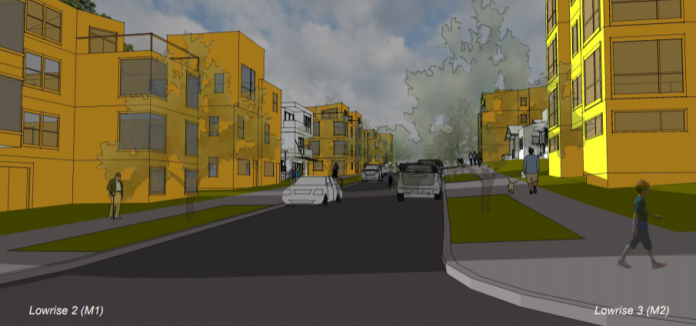Just before Thanksgiving, housing advocates got some good news as Seattle Hearing Examiner Ryan Vancil released a ruling mostly in favor of the City’s Mandatory Housing Affordability (MHA) rezones.
The reason why MHA isn’t the law of the land in most of Seattle’s urban villages and commercial districts is because homeowner advocates, under the umbrella group SCALE, brought an appeal on just about every aspect of the program’s Final Environmental Impact Statement (FEIS). Getting through the 43 issues SCALE raised took the Hearing Examiner nearly a full calendar year.
A recent memo sent by the director of the Seattle Department of Construction and Inspections (SDCI) to the City Council estimated that the delay on implementing the program across the city has resulted in a loss of 653-717 units of affordable housing.
After sifting through SCALE’s scattershot nitpicking, Hearing Examiner Vancil sided with the City, but he did instruct the City to come back with a bit more analysis about impact to historical sites. He also offered the City some free political advice.
“While the level of analysis for most of the FEIS satisfies the rule of reason and requirements under SEPA, the more ‘granular’ level of analysis called for and debated at the hearing may have averted at least some of the deeply felt community concern expressed in nearly four weeks of hearing and in a hearing process that has taken the better part of a year,” Vancil said.
People who have closely followed Seattle’s housing debates may disagree that housing opponents can be so easily appeased. Was there somehow a number of hoops the City could have jumped through to win the support of SCALE groups without comprising the program? It seems doubtful.
Note that Queen Anne Community Council continues to block the backyard cottage proposal even after more than a year of further analysis (after the homeowner group appealed and convinced the Hearing Examiner to block an earlier Determination of Non-Significance that hoped to avoid a full Environmental Impact Statement (EIS) process in that case). The EIS found that wealthy homeowners would gain substantially from the backyard cottage proposal, but nonetheless they persisted in obstruction.
The ruling builds on a earlier pre-hearing ruling that also went largely in the City’s favor.
Councilmember Rob Johnson, who chairs the Planning, Land Use, and Zoning Committee and has taken responsibility for shepherding through the MHA rezones, struck a triumphant tone in his press release, but lamented the delay.
“I am glad that after one year and one of the longest appeals in Seattle’s history, the Hearing Examiner has allowed the City to move forward with its work on the Citywide MHA proposal,” Councilmember Johnson said. “While there is more analysis to be done, today’s decision means that after a long delay, the City Council will be able to continue consideration of this important proposal to create more affordable housing during our housing crisis. With this legislation, we have an opportunity to allow for more desperately needed housing in Urban Village neighborhoods across our city, while requiring that all new development in those areas provide affordable housing.”
Councilmember Johnson also pointed out that MHA, which is already in effect in the University District, Downtown, South Lake Union, Uptown, and a portion of 23rd Avenue, is already contributing vast sums to affordable housing.
“In the neighborhoods where MHA has already been implemented, it is working,” Councilmember Johnson said. “This month, Mayor Durkan announced that MHA brought in more than $13 million to create affordable housing this year.”
The MHA appeal news broke the same week Johnson announced he would not be seeking reelection next year. Even without a second term, it appears he will be able to see MHA passed in all urban villages before leaving office. Some are predicted it will pass in the summer. Mayor Durkan vowed the City would take action in “early 2019” in her press release. Councilmember Johnson said the council’s Selection Committee on MHA will meet December 3rd to lay MHA’s path forward now that the appeal challenge has been met.
That said, SCALE still has one more opportunity to appeal the Hearing Examiner ruling via a judicial appeal, which they have until December 12th to make.
While MHA is off the Hearing Examiner’s desk, still on it and delayed is the second backyard cottage appeal and an appeal of Fort Lawton affordable housing. That timetable had been slowed so homeowner activist Elizabeth Campbell could still take her European vacation.
Doug Trumm is publisher of The Urbanist. An Urbanist writer since 2015, he dreams of pedestrian streets, bus lanes, and a mass-timber building spree to end our housing crisis. He graduated from the Evans School of Public Policy and Governance at the University of Washington in 2019. He lives in Seattle's Fremont neighborhood and loves to explore the city by foot and by bike.


